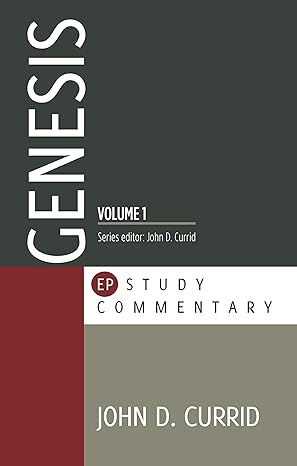A Book Review from Books At a Glance
by B. Jason Epps
Dr. John D. Currid received his PhD from the University of Chicago. He is the Carl McMurray Professor of Old Testament at the Reformed Theological Seminary in Jackson, Mississippi. He is also the series editor for the EP Study Commentaries and Welwyn Commentaries. Currid has also written the EP commentary on the Pentateuch and the Welwyn commentaries on Joshua, Ruth, and Habakkuk.
Currid takes a covenantal approach to reading the book of Genesis. As such, he sees Genesis as not only a book that testifies to God’s faithfulness, but a book that tells the history of the church. This especially drives his application where he draws direct parallels between the lives of the Israelites and our current day. He holds to Mosaic authorship for the book of Genesis. He briefly mentions the other critical perspectives such as the fragmentary hypothesis and the documentary hypothesis. He also includes a general overview of the presuppositions of these positions, focusing on Hegel. He then discusses the five arguments of critical theory and their accompanying responses. Having discussed both sides, he then discusses the support for Mosaic authorship, drawing from both the Old Testament and New Testament.
Currid adheres to the framework view of the creation account for which creation is not understood as sequential, but rather figurative and as a polemic against other Ancient Near Eastern myths. In support of the framework view, he argues, is that it harmonizes with general revelation. By this, he seems to imply scientist’s interpretation, which if modern science is correct, the framework view would account for the possibility of millions of years. However, there appears to be considerable evidence that scientists are wrong in their interpretation of the data. If this is true, there is no perceived conflict between Genesis 1 and general revelation.
Currid demonstrates the similarities and differences between Ancient Near Eastern contemporary literature and the biblical account in order to demonstrate how the Pentateuch broadly and, by extension, Genesis is functioning as a polemic. He does not expressly say whether he views the whole of the Pentateuch as one complete book. However, he seems to imply it when he discusses the concept of Genesis functioning as a polemic. His first examples are from the ten plagues in the book of Exodus to explain polemical theology. Then he juxtaposes biblical accounts and the Ancient Near East accounts. For example, he discusses the creator and manner of creation, showing the intentional parallels between ancient Egyptian literature and the Bible while pointing out its distinct differences. He then discusses direct prophecy of the Messiah, most notably Genesis 3:15, and Genesis’ use of typology. He argues that there are regular occurrences of theophanies in the book of Genesis, for example in Genesis 32, where Jacob is wrestling with the angel of the Lord. However, he does argue that it should not be forced into the text, but only should be brought out if it is there. While this is an admirable position, it is difficult to do because what is forced and what is not can often be seen as arbitrary.
In each chapter of the commentary, Currid gives an overview of the discourse unit. For example, chapter 1 covers Genesis 1:1–2:3. Within each chapter, he subdivides it into essential paragraphs. In his commentary itself, it is slightly technical. He uses Latin, which he defines, and he transliterates Hebrew terms, but he uses grammatical terms, for example, Qal stem, and mentions vav-consecutive saying it was an and with an imperfect, which he does not explain which could be disorienting for some readers. If readers are not familiar with the terminology beforehand, they may be lost. His commentary does not analyze verse-by-verse, but rather takes the broad themes of the sections. He ends each minor vignette with an application where he condenses his textual analysis and then directly applies it to the New Testament. I appreciate what he is doing in regard to his application; however, the way they are written it almost seems like the text is only valuable if it is connected to the New Testament.
In general, this commentary seems to be straddling approachability and technicality, which it does not seem to succeed at either. Since only some of the more technical grammatical terms are defined, readers unfamiliar with Hebrew terminology could get lost. At the same time, because of its broad analysis, it does not fill the need for more advanced students of a verse-by-verse commentary. This commentary could be useful if one is just looking for a general overview of information in Genesis and is not intimidated by technical terms.
B. Jason Epps
Midwestern Baptist Theological Seminary
Buy the books

GENESIS: VOLUME 1 (EP STUDY COMMENTARY), by John D. Currid

GENESIS: VOLUME 2 (EP STUDY COMMENTARY), by John D. Currid